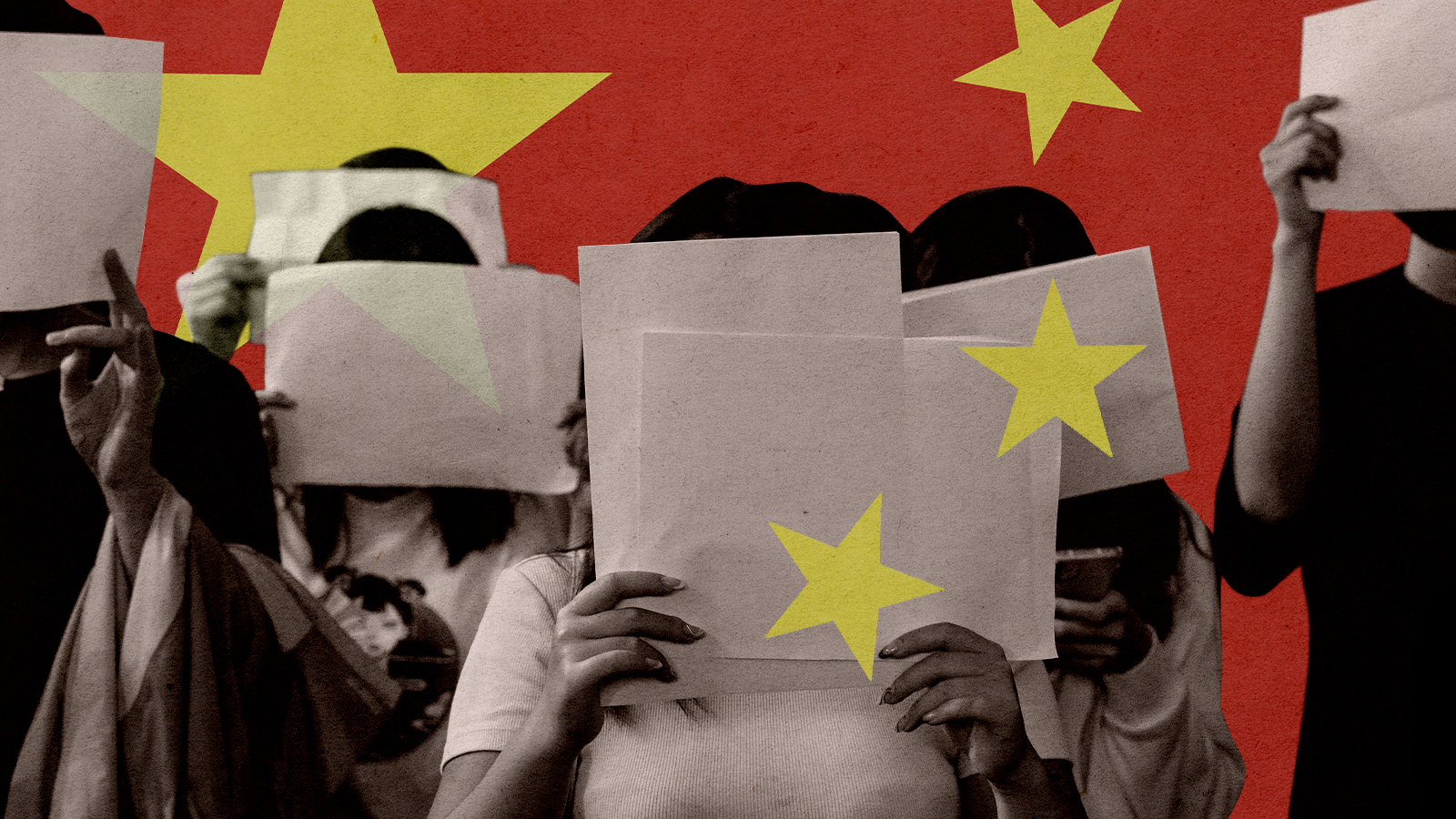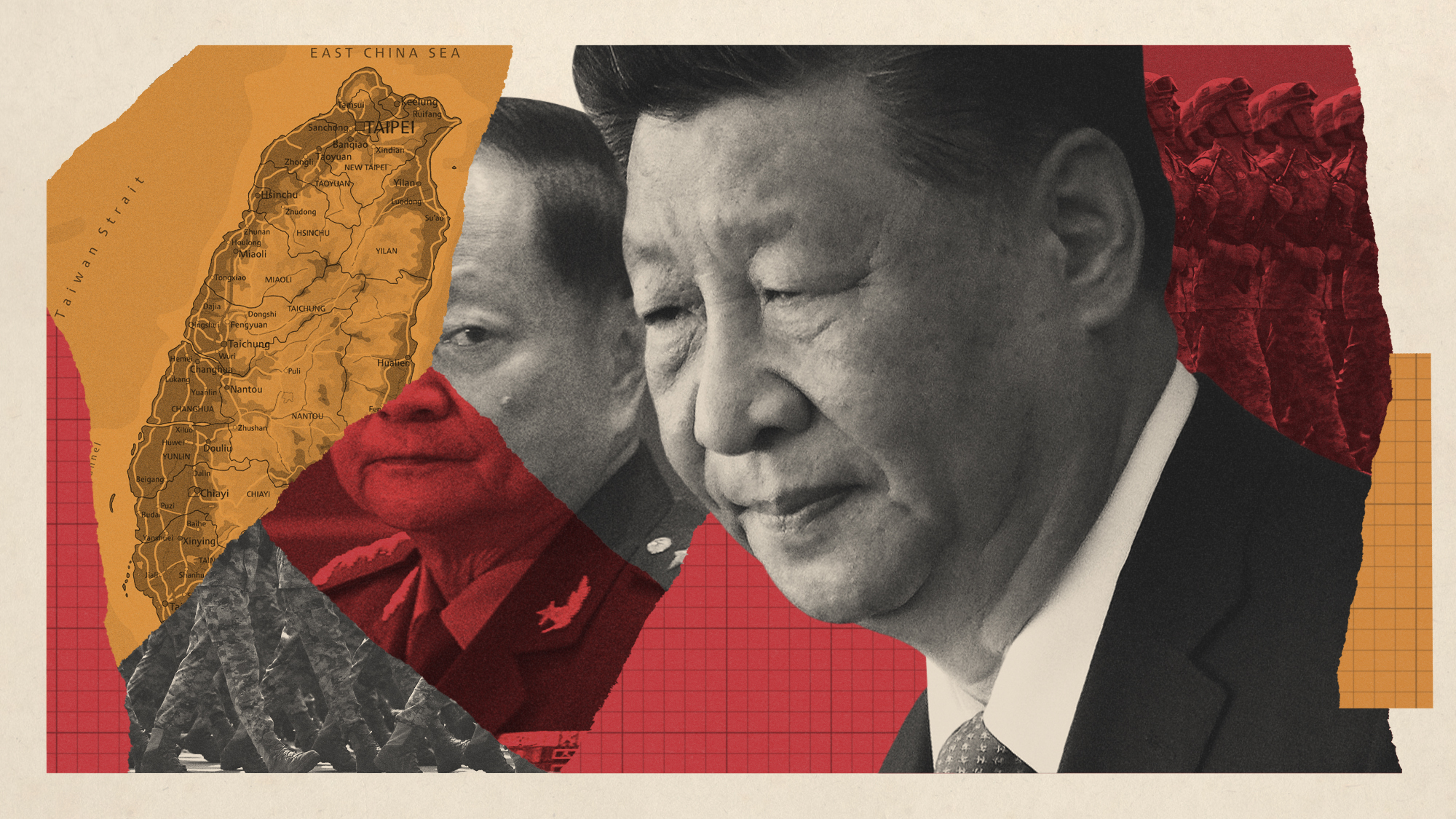Are China's protests a real threat for Beijing?
The sharpest opinions on the debate from around the web


A free daily email with the biggest news stories of the day – and the best features from TheWeek.com
You are now subscribed
Your newsletter sign-up was successful
Protests against Beijing's "zero COVID" restrictions have spread across China in the biggest outburst of unrest since President Xi Jinping took power more than a decade ago. Government critics blamed lockdown rules for a slow response to an apartment-building fire that killed 10 people in the remote city of Urumqi, fueling public anger. Two groups totaling 1,000 or more protesters gathered in Beijing on Monday. "We don't want masks, we want freedom," one of the groups chanted. "Lift the lockdown," demonstrators shouted at a different protest, in China's far west.
The government says it has been prioritizing lives over the economy by enforcing COVID lockdowns. Authorities are trying to curb China's biggest coronavirus outburst since the pandemic and its related restrictions began three years ago. The restrictions have reduced foot traffic, hurting small businesses, and cut into production at major factories, like a Foxconn facility in Zhengzhou in central China that makes Apple iPhones. Some protesters have called for Xi to resign in a rare challenge to Communist Party leadership. Beijing on Monday eased restrictions in some areas, while reaffirming its "zero COVID" strategy and dispatching police to prevent further anti-government rallies. President Xi has few good options to defuse the crisis. How much of a threat are the protests to Xi's leadership?
The protests could ignite a real threat
These extraordinary protests "represent a direct challenge to how the government is running the country," says Matthew Brooker at Bloomberg. "Such a large-scale and unified display of defiance has been unseen since the 1989 Tiananmen movement." Videos circulating show shocking scenes. In one, a man shouts to a crowd in Shanghai, "Xi Jinping!" The crowd responds, "Step down!" Students at Xi's elite alma mater, Tsinghua University in Beijing, are lashing out at government censorship. "Such scenes may be commonplace in democracies where rights to demonstration and free expression are entrenched. They are astonishing in China."
The Week
Escape your echo chamber. Get the facts behind the news, plus analysis from multiple perspectives.

Sign up for The Week's Free Newsletters
From our morning news briefing to a weekly Good News Newsletter, get the best of The Week delivered directly to your inbox.
From our morning news briefing to a weekly Good News Newsletter, get the best of The Week delivered directly to your inbox.
Xi and his allies can probably defuse the situation before things get out of hand. The Communist Party in China "has long experience of neutering potential challenges, and today's China is far from the liberal intellectual climate that allowed the Tiananmen movement to flourish." Still, "a single spark can start a prairie fire, as Mao Zedong once wrote, citing an ancient proverb. No one knows that better than the Communist Party."
What matters is whether the frustration seeps into the Communist Party
"China's Communist Party runs the world's most extensive surveillance and police state," so the protesters are the ones really at risk here, says The Wall Street Journal in an editorial. But that's why this open defiance is so remarkable. It shows how deeply frustrated China's citizens are with the government's "draconian zero COVID restrictions," which have shut down entire cities for weeks or months at a time over the past three years, "without public debate or recourse. If "signs of dissent" start appearing among party elites, Xi might find he doesn't have the total control his propagandists have been claiming.
The rest of the world should "welcome this Chinese uprising" against the party's absolute control. The government "has advertised zero COVID as an example of the superiority of its Communist system over messy Western democracy." The never-ending lockdowns have kept the official tally of deaths lower than in the West, but left the Chinese public with "far less natural immunity." Also, "blinkered nationalism" has led Chinese leaders to use only the inferior domestic Sinovac vaccine, refusing imports of Western mRNA vaccines. That could backfire spectacularly, as it leaves citizens vulnerable to the mutating virus. President Biden should "support popular protests that remain peaceful." Beijing will try to shift the blame to its foreign critics. "But the Chinese public knows who is responsible for zero COVID, and it isn't a foreign power."
Rolling back zero-COVID is Xi's best option
Xi has two choices: Roll back his COVID restrictions, or crack down, says Minxin Pei at Nikkei Asia. Beijing has quite a track record "of suppressing mass protests since the 1989 Tiananmen crackdown." China sees tens of thousands of localized demonstrations, riots, and collective petitions every year, and "the party has seldom failed to quell them quickly." But this is "a totally different kind of mass protest." It's not confined to a village or town. These protests "are nationwide and target China's top leader and his policy," and they involve a coalition of migrant factory workers, college students, and "middle-class folk," not an isolated group.
A free daily email with the biggest news stories of the day – and the best features from TheWeek.com
Xi's "most sensible option" is to declare that he has "heard the people" and will loosen the restrictions. "Abandoning zero COVID could pay dividends on multiple fronts. The Chinese economy could expect an instant rebound. Xi might also regain credibility as a leader capable of ditching a counterproductive policy." But it will cost him politically, because jettisoning the policy "now could be seen as a humiliating defeat." That might erode the Mao-like, "unchallenged power" he cemented at the 20th National Congress of the Chinese Communist Party a month ago. But jailing throngs of protesters would be a temporary fix that might only fuel future unrest. "Ending zero COVID would be by far the lesser of two evils."
Beijing is bound to choose a crackdown
"Xi is unlikely to tolerate dissent for long," says Patrick Wintour in The Guardian, "since he is likely to see the protests as a challenge not to just his COVID policy but to collectivist communist ideology, and his authority." Since his appointment as party general secretary in 2013, Xi has been warning about the "paramount importance of protecting ideological supremacy, saying 'once ideological defenses are breached, other defenses are very difficult to hold.'" Maybe "some dam has burst," maybe not. "Either way, expect the ruthless methods deployed in Hong Kong to be put to use on the mainland."
But this is already a major setback for Xi. It's "a blow to his international prestige only months after returning to the world stage." He has been going on and on about "the great rejuvenation of China, the decline of the West," and the Chinese Communist Party's unique power to "change the course of history." With crowds in cities across China now calling for him to get lost, Xi "now risks looking mortal, and dangerously out of touch."
Harold Maass is a contributing editor at The Week. He has been writing for The Week since the 2001 debut of the U.S. print edition and served as editor of TheWeek.com when it launched in 2008. Harold started his career as a newspaper reporter in South Florida and Haiti. He has previously worked for a variety of news outlets, including The Miami Herald, ABC News and Fox News, and for several years wrote a daily roundup of financial news for The Week and Yahoo Finance.
-
 The ‘ravenous’ demand for Cornish minerals
The ‘ravenous’ demand for Cornish mineralsUnder the Radar Growing need for critical minerals to power tech has intensified ‘appetite’ for lithium, which could be a ‘huge boon’ for local economy
-
 Why are election experts taking Trump’s midterm threats seriously?
Why are election experts taking Trump’s midterm threats seriously?IN THE SPOTLIGHT As the president muses about polling place deployments and a centralized electoral system aimed at one-party control, lawmakers are taking this administration at its word
-
 ‘Restaurateurs have become millionaires’
‘Restaurateurs have become millionaires’Instant Opinion Opinion, comment and editorials of the day
-
 How did ‘wine moms’ become the face of anti-ICE protests?
How did ‘wine moms’ become the face of anti-ICE protests?Today’s Big Question Women lead the resistance to Trump’s deportations
-
 The UK expands its Hong Kong visa scheme
The UK expands its Hong Kong visa schemeThe Explainer Around 26,000 additional arrivals expected in the UK as government widens eligibility in response to crackdown on rights in former colony
-
 ‘Hong Kong is stable because it has been muzzled’
‘Hong Kong is stable because it has been muzzled’Instant Opinion Opinion, comment and editorials of the day
-
 What do Xi’s military purges mean for Taiwan?
What do Xi’s military purges mean for Taiwan?Today’s Big Question Analysts say China’s leader is still focused on reunification
-
 ‘My donation felt like a rejection of the day’s politics’
‘My donation felt like a rejection of the day’s politics’Instant Opinion Opinion, comment and editorials of the day
-
 What is at stake for Starmer in China?
What is at stake for Starmer in China?Today’s Big Question The British PM will have to ‘play it tough’ to achieve ‘substantive’ outcomes, while China looks to draw Britain away from US influence
-
 Is Alex Pretti shooting a turning point for Trump?
Is Alex Pretti shooting a turning point for Trump?Today’s Big Question Death of nurse at the hands of Ice officers could be ‘crucial’ moment for America
-
 ‘It’s good for the animals, their humans — and the veterinarians themselves’
‘It’s good for the animals, their humans — and the veterinarians themselves’Instant Opinion Opinion, comment and editorials of the day
